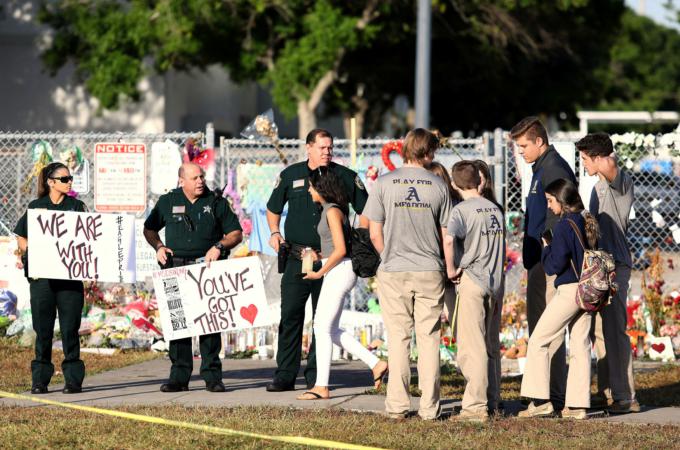Ending a culture of violence
A horrific mass shooting at a Florida high school has left 17 people dead and placed school violence and gun control at the forefront of public debate.
Proposals include stricter regulations on semiautomatic and automatic weapons, a ban on "bump stocks" that make the former more deadly, better background checks, a higher legal age for gun ownership, making it easier to get restraining orders against gun possession by disturbed people, and increased investment in mental health programs.
These should be considered in light of the best evidence on what will save lives without violating our constitutional freedoms. In this area, I am no expert.
One proposal I dislike involves arming teachers, which risks changing the culture of our schools for the worse. I think of the nuns who taught me in middle school, and the Marist brothers and devout laymen who gave me a fine high school education, and I struggle in vain to imagine them packing heat. Nor do I want crazed gunmen to avoid heavily armed public schools to target those run by churches.
And gun violence is a larger problem. It takes over 30,000 lives a year. Mass shootings are a tiny percentage of this alarming total. Suicides, a scourge among our young people, make up more than half of it. Days after the Florida shooting, there were reports of a 13-year-old boy who shot himself in a middle school restroom in Ohio and died.
Millions of guns have been in Americans' hands for a long time. Why these senseless acts of violence by boys and young men now?
Psychologist Warren Farrell, author of "The Boy Crisis," says the males perpetrating recent mass shootings share one characteristic: "minimal or no father involvement" in their lives. The Florida shooter's adoptive father died when he was young, and his adoptive mother died from a respiratory illness in November; he was living with foster parents with whom he felt no connection.
Farrell says the presence of a strong male role model shows adolescent boys how to channel their aggressive impulses in positive directions, how to be a man. "Dad-deprived" boys are more likely to turn those impulses into aggression against others and themselves.
Obviously, most boys raised in our growing number of single-parent families do not become violent. Most single mothers do a great job raising their children, and some kinds of male role model are worse than none at all.
But it is important for society to help fill the gap. Teachers, coaches, Big Brothers, scoutmasters, youth ministers and others have traditionally done so. But as Robert Putnam's book "Bowling Alone" documented 18 years ago, Americans have become more isolated, and the bonds within local communities are stretched thin.
Churches in particular have offered a moral code against taking human life -- a countercultural message, in a nation where abortion and assisted suicide are praised -- and a caring community that spans generations. But churches are losing young members too.
So what do we do, since we must do something? The policy debate continues, and I hope it includes discussion of the loneliness and alienation of boys in our society.
In the meantime, blogger Rob Myers says each of us personally -- including students -- could do something: "Notice those around you who seem isolated, and engage them." One friendly hand, an expression of interest or concern, may help a teen or young man come out of his shell a bit and change direction.
Myers admits most people probably won't take this leap. I wonder what our excuse will be as Christians for not doing so?
- Richard Doerflinger worked for 36 years in the Secretariat of Pro-Life Activities of the U.S. Conference of Catholic Bishops. He writes from Washington state.



















